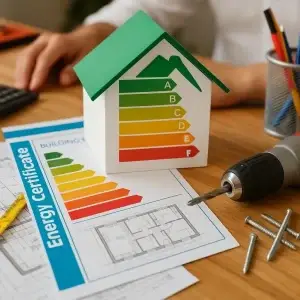What Is a Certified SAP Rating Assessor?
When building a new house or flat in the UK, we need to make sure it meets certain energy rules. That’s where SAP rating assessors step in. SAP stands for Standard Assessment Procedure, and it’s the way the government checks how energy-efficient a property is. A certified SAP assessor looks at the plans for your new build and works out how much energy it will use and how much carbon it will produce. This helps decide if a property follows the rules and if changes need to be made before or during construction.
At Ratio Seven, we work with experienced, qualified SAP assessors who focus on newly built properties across the UK. Our job is to help builders, architects, and developers get it right the first time, avoiding delays and making sure the build stays on track.
Why SAP Ratings Matter for New Build Homes
If you’re putting up a new house or block of flats, the law says you must have an SAP calculation. This applies whether you’re building one home or one hundred. It’s part of meeting Building Regulations, and without the right SAP score, your project can’t move forward smoothly.
An accurate SAP report helps in many ways:
- It makes sure the home follows the building energy rules
- It points out ways to improve insulation, heating, and lighting
- It helps future owners or tenants understand how much they’ll spend on energy
- It shows how the home affects the environment
We provide SAP Calculations for New Builds that allow developers and small builders alike to stay on top of things. It’s about keeping things simple and clear while making smart decisions based on facts.
What Does a SAP Rating Assessor Do?
A certified SAP assessor will look at drawings, building materials, and the systems planned for heating, hot water, and lighting. They collect lots of details to put into special software. From this, the software works out two important numbers:
- The Energy Efficiency Rating (from 1 to 100+)
- The Environmental Impact Rating (also from 1 to 100+)
These numbers are used to create an EPC or Energy Performance Certificate. A newly built home must achieve a passing score; otherwise, time and money will be spent making changes.
We often get asked how early an SAP assessor should be involved. The answer: as early as possible. Working with a certified SAP assessor during the design phase means you can tweak materials and building methods to get a good result before the property is built.
We make this process straightforward. Our team at Ratio Seven works closely with both architects and builders to give advice from the start, saving time later on.
Common Mistakes to Avoid with SAP Calculations
Even the best-designed homes can run into trouble if the SAP calculation is rushed or based on poor data. Some mistakes we’ve seen include:
- Not sending the latest building drawings
- Choosing heating systems that don’t meet energy targets
- Not planning for enough insulation or ventilation
- Assuming Windows with low performance will still pass
These problems might sound small, but they can cause a build to fail SAP scoring. Our assessors dig deep during the planning stage to stop these issues before they begin.
At Ratio Seven, we know what Building Control looks for. That’s why we double-check details most others miss out on, like the direction your windows face or where thermal bridging might reduce the score. Getting it right early pays off once the build gets going.
How SAP Scores Affect Planning and Construction
You can’t start construction without making sure your plans will pass Building Regulations Part L, which covers energy use. The SAP rating is key to this.
If your design fails, your planning permission might be delayed, or Building Control could prevent work from starting. Worse still, if the property doesn’t match the SAP calculation when it’s finished, you may be forced to change heating or insulation systems after construction, which can be costly.
By contacting Ratio Seven early in the process, you avoid delays later on and make sure contractors build to the right specifications from day one. We’ve seen how much stress this can save people.
SAP scores also influence how marketable your finished homes are. Buyers or renters often check the Energy Performance Certificate. A good rating means cheaper bills and better appeal.
When to Get Your SAP Rating Sorted
The best time to appoint a SAP assessor is when your building plans are nearly final. This way, we work with proper drawings and a solid idea of your materials and heating setup. Still, tweaking at this stage is easier and far cheaper than after the house is built.
When you work with us at Ratio Seven, we handle both the Design Stage SAP and the As-Built SAP. This means:
- We help get the project approved before work starts
- We update the rating when the project is done and issue the EPC
This full journey support means no awkward surprises when selling or letting the home later on.
We can also help if changes are made during the build, say you switch heating systems or change insulation suppliers. Just let us know, and we’ll update the reports to keep things moving.
 FAQs
FAQs
Do self-built homes need a SAP rating?
Yes, even if you’re building your own house, you still need an SAP calculation and an EPC to meet the rules.
How long does a SAP assessment take?
Once we have your final plans and full information, we can often turn your SAP calculations around in just a few days.
Do you need SAP reports for extensions or conversions?
You do, but these are slightly different. For extensions, we use something called a SAP extension calculation, and for barn conversions or renovations, we use different rules.
Can I improve my SAP score once I get the results?
Yes. The SAP assessor might recommend better windows, extra insulation, or more efficient heating. We’d help you decide what works best for your build and budget.
Can you work with my architect or builder?
Absolutely. We often link up directly with architects, project managers, and M&E consultants to make things easier for everyone.
Tips for Getting a Better SAP Score
We’re often asked how to get a higher SAP score. Here are some tips we share with our new-build clients:
- Pick a heating system that’s highly rated, such as air source heat pumps
- Make sure your insulation is well above the minimum standard
- Limit the number of windows on north-facing walls
- Reduce gaps in insulation that might cause heat to escape
- Think about mechanical ventilation with heat recovery
Choosing the right options early saves time, money, and stress later. We help guide you through what makes sense for your project, based on the budget you’ve already planned for. Every build is different, and we never advise making changes that don’t help.
Why Choose Certified Assessors from Ratio Seven?
SAP assessments can be confusing, especially if you’ve never dealt with one before. That’s why working with someone who is qualified and experienced matters.
With certified assessors from Ratio Seven, you get a team that:
- Understand new build standards
- Helps you pass Building Regulations Part L
- Gives clear advice you can trust
- Works quickly without missing the details
We’ve helped projects large and small across the UK receive the SAP scores and EPCs they need. Whether it’s a detached home or a set of flats, we make sure you start on the right foot.
Working With SAP Rating Experts Makes the Build Easier
Newly built homes come with rules and checks to make sure they’re energy-smart and built to modern standards. SAP assessments are a big part of that. With certified SAP assessors like ours at Ratio Seven, you don’t have to face it alone.
We work alongside your design team to get the job done right the first time. From early planning to the final EPC, we make sure there are no delays, missed steps, or last-minute surprises. Our clients across the UK know us for being reliable, thorough, and friendly.
Let us help you with your SAP calculations for new builds and stay on track. Get in touch today and let Ratio Seven take some of the pressure off while you focus on what you do best, bringing your build to life.




